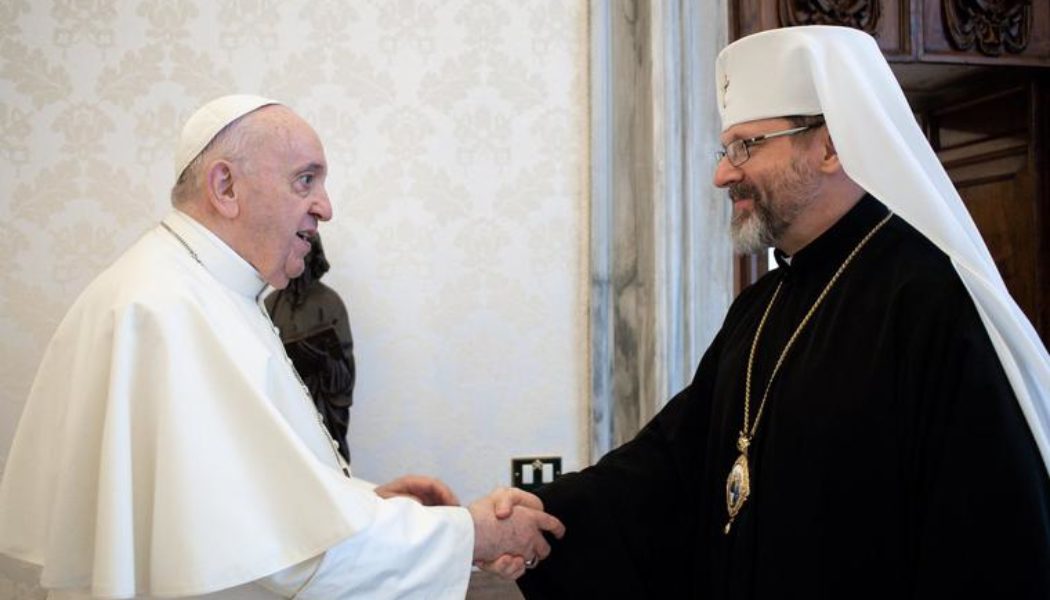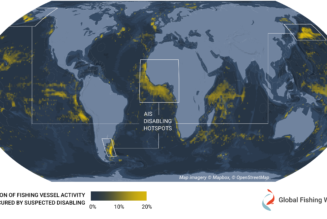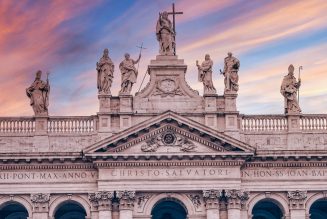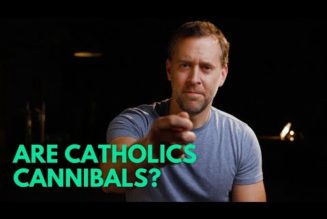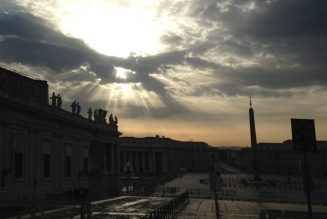
VATICAN CITY — A papal visit to war-torn Ukraine would be fraught with complex challenges, but it would likely show solidarity with Ukrainian victims, possibly slow Russian aggression, and help improve Catholic relations with Ukrainian Orthodox and Jewish communities, analysts have told the Register.
Pope Francis first revealed the possibility of a visit en route to Malta on April 2, saying the trip was “on the table.” He later expanded on the possibility the following day.
“The idea is there, among the proposals I have received,” he told reporters on the return flight from Malta, “but I don’t know if it can be done, if it is fitting, and whether it would be for the best or if it is fitting to undertake it, whether I should go. … All this is up in the air.”
Vatican spokesman Matteo Bruni told the Register on April 7 that “there has been nothing new” on the visit since the Pope made those remarks, but the possibility continues to be discussed.
Major Archbishop Sviatoslav Shevchuk, head of the Ukrainian Greek Catholic Church, said in an April 3 statement that the local Catholic Church leaders and government officials were “working to ensure that the Holy Father’s visit to Ukraine takes place” and that he hoped it would happen “as soon as possible.”
In April 6 comments to the Register, Archbishop Borys Gudziak, the archeparch of the Ukrainian Catholic Archeparchy of Philadelphia, believed it would communicate solidarity with the people. “Being with people who suffer speaks louder than words,” he said. “Solidarity is particularly real when it is incarnated.”
The visit would come just weeks after Russian President Vladimir Putin ordered troops to invade Ukraine on Feb. 24 in a military operation aimed at toppling President Volodymyr Zelenskyy and replacing his government with a pro-Russian regime. As of April 6, along with thousands of military casualties on both sides, the conflict had cost 1,611 civilian lives, including 131 children, and 2,227 injured, according to the Office of the United Nations High Commissioner for Human Rights.
The invasion, which sparked international condemnation, led to the imposition of stiff economic sanctions on Russia, the censoring of Russian state media, and weapons sent from Western nations to bolster Ukraine’s armed forces.
Pope Francis, who has not specifically named Russia or President Putin, in keeping with the Holy See’s tradition of maintaining channels of dialogue, has condemned the war as “barbarism,” “unacceptable” and “infantile and destructive aggression,” while also declaring that war is “always unjust” and “never the way.” On Wednesday, he spoke of the impotence of the United Nations.
Evaluating the Possibilities
The idea for a papal visit to Ukraine has been circulating for some weeks. The apostolic nuncio to Ukraine, Archbishop Visvaldas Kulbokas, told EWTN’s Raymond Arroyo on March 17 that the mayor of Kyiv had invited Pope Francis to visit and that the Pope was “evaluating” all the possibilities.
As the casualties have continued to mount, support for a papal visit to Ukraine has grown among diplomats and Church leaders, although its effectiveness and feasibility continue to be debated.
Any such visit would likely be to the Ukrainian capital of Kyiv, home to the first Ukrainian Christian church, the seat of Major Archbishop Shevchuk and where President Zelenskyy continues to reside.
It has consequently been a prized target of Russia, whose troops began surrounding the city in March but have reportedly since retreated, sacking the nearby town of Bucha in the process. The U.N.’s humanitarian chief and others are calling for investigations into who was ultimately responsible for what Pope Francis condemned as the “massacre of Bucha” after the discovery of the bodies of dozens of civilians in mass graves and on the streets, including women and children.
“The presence of the Holy Father just might challenge President Putin to slow the aggression,” said Archbishop Gudziak. “However, given the explicitly hateful rhetoric of President Putin and other representatives of the Russian government and the macabre behavior of the Russian forces, I think that there are no guarantees that it will.”
George Weigel, distinguished senior fellow of the Ethics and Public Policy Center, said such a visit could further peace, but only if it helped point to Russia as the aggressor.
“The key thing for Vatican diplomacy to do now is name the barbarism and aggression for what they are,” Weigel told the Register.
“This is not a case of two morally commensurable combatants who need to be separated so that a compromise peace can be achieved,” he added. “It’s an aggressor versus an innocent victim, and the aggressor should be branded as such so that a peace that does not reward aggression becomes somewhat more likely.”
On the political level, such a visit would likely be seen by Moscow as further isolating Russia and as the Holy See taking sides, potentially jeopardizing any Vatican mediation efforts. Ukraine’s new ambassador to the Holy See, Andrii Yurash, told Crux on April 5 that, although other nations would back such a visit, Russia has been “trying to convey in every possible way” that the Pope in Kyiv “would not be acceptable for them because it would be a clear sign of support for Ukraine.”
Archbishop Gudziak believes Moscow could use the visit to “foment hatred of ‘the other’ inside Russia,” but added “one hopes” that Moscow “would recognize the Holy Father as the messenger of peace that he is.”
“Russia needs to be open to any gesture that will allow it to move away from a stance, policy and practice that ultimately are suicidal — morally and otherwise,” he said.
Weigel, who has long promoted a democratic and independent Ukraine in the face of Putin’s designs on country, said he “certainly hoped” a visit would show the Vatican “is taking sides against aggression.”
Russian Orthodox
On the ecumenical level, a possible mitigating factor is upsetting the Russian Orthodox Church and putting on hold what had until recently been real prospects of a second meeting between Francis and Patriarch Kirill. The patriarch has so far backed Russia’s invasion, partly on the premise that it represents a battle against immoral Western secular values and is about the future of mankind.
“A visit to Kyiv might further inflame Russian Orthodoxy’s long-standing animus towards Rome,” warned Robert Royal, president of the Faith and Reason Institute, adding that these strained relations were “only slightly tamped down” by Pope Francis’ historic meeting with Russian Orthodox Patriarch Kirill in Cuba in 2016.
But he believes that, even if the visit “evoked different reactions,” it might still show the world that “the war is wrong and needs to stop immediately.” Diplomatic compromises and future relations “can be worked out over time, but after the killing and destruction stop,” Royal said.
Weigel thinks the Vatican should “sever ecumenical relations with Russian Orthodoxy” until the Russian Orthodox leadership ceases acting as “an instrument of Russian state power and a mouthpiece for Kremlin propaganda and disinformation.”
Renato Cristin, professor of hermeneutic philosophy at the Italian University of Trieste, believes a papal trip to Ukraine would be “excellent” not only because it will be a sign of spiritual closeness to the Ukrainian people but also because it would underline the difference between the “Holy Roman Church and the Orthodox Church of Patriarch Kirill.” The patriarch, he told the Register, “frankly seems blasphemous when he defines the attack on Ukraine as a metaphysical war on the West.”
The Russian Orthodox Church aside, Cristin believes a papal visit to Ukraine could foster unity with the Ukrainian Orthodox Church. Others have said it similarly could also bring the Catholic Church closer to other Christian denominations in Ukraine and nearer to the Jewish minority in Ukraine with the possible attendance of Christian and Jewish leaders at ecumenical and interreligious meetings in Kyiv presided by Francis.
Such gestures “would be a particularly expressive moral sign,” Archbishop Gudziak said, but he added that bringing a large contingent of diplomatic and religious delegations could hinder humanitarian efforts and delay a visit for which “there is an urgent need and urgent call.”
Safety Concerns
Other key issues are safety, both for the Pope and pilgrims, and other practical considerations.
Speaking to Il Messaggero April 5, Archbishop Kulbokas, one of just three resident ambassadors to remain in Kyiv, said a trip would be “feasible through Poland,” but it would be a “tiring journey,” as it takes “half a day, between one transfer and another, just to get to Poland, and from there you have to continue to Lviv.” The next leg would be a “long journey” to Kyiv, resulting in a whole “day of travel” — “one day just to go and another just to come back.” He added that the visit also “depends on the war situation that day” in Kyiv.
Another major factor is what the Pope would do once he arrives.
“Who could he see? What could he do?” Archbishop Kulbokas asked. “Of course, a very small trip can also be assumed, with no follow-up and no large events. But at the moment it would be unrealistic and highly risky to imagine a trip with public events, even minimal ones, or normal trips, and with journalists in tow.”
The 47-year-old Lithuanian-born papal ambassador, who said he so far only has partial knowledge of the visit, sees any such trip as “an atypical papal journey, not a true apostolic journey that involves meeting the people.” But he envisioned “some prophetic moments of closeness to the suffering people, perhaps a Mass in the cathedral and a meeting with the [Ukrainian] Council of Churches” — an interdenominational institution aiming to spiritually revive Ukraine and which, he said, “is really very united.”
Perilous Trip
Pope Francis has flown into a war zone before: In 2015, he became the first pope to visit a country suffering from civil war when he traveled to Bangui, the capital of the Central African Republic, and visited a mosque under siege from Christian armed militias.
Other popes have also taken risky apostolic voyages: Pope St. John Paul II visited Rwanda a few years before the country’s genocide, and Benedict XVI made a treacherous visit to Turkey in 2006 just weeks after his Regensburg speech set off an uproar in the Islamic world.
But a trip to Ukraine would be the riskiest yet for a pope, and the Holy See continues to weigh the dangers and benefits of such a journey.
“The right conditions must be created, the conditions for concrete steps towards peace,” Cardinal Michael Czerny, who has spent recent weeks visiting refugee camps in countries bordering Ukraine, told the Italian daily Il Giornale April 5. “The initiative would have great resonance, not only for the political and military situation, but also for ecumenical dialogue.”
The cardinal, who is prefect ad interim of the Dicastery for Promoting Integral Human Development, said the trip “would have in general a great significance, not only symbolic, because the Holy Father is one of the most followed and listened to figures at the international level, even by those who are not Christian or Catholic.”
Should such a visit take place, Archbishop Gudziak said he believed the Lord would “accompany Pope Francis with his powerful grace and loving kindness.”
“We need a miracle,” the archbishop said. “God’s grace affects miracles.”
Join Our Telegram Group : Salvation & Prosperity
